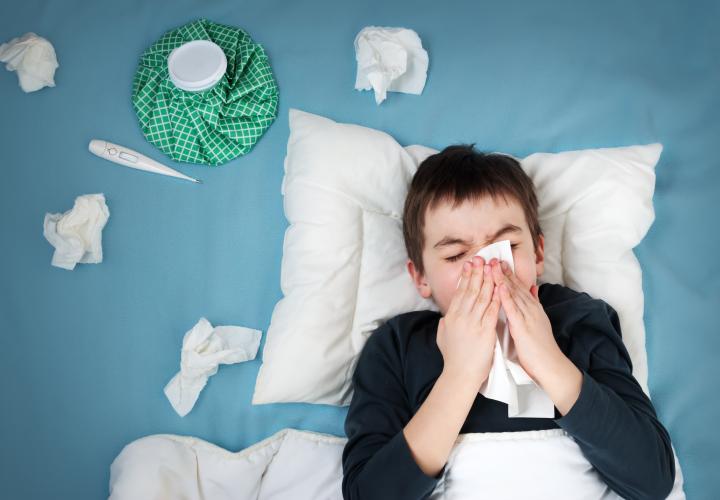Runny noses, sneezing, sore throats and coughs—all par for the course during cold and flu season and a childhood rite of passage. One of the most common causes of these symptoms is a virus called rhinovirus. Turn to the ones parents trust to know what to expect if your child is sick with rhinovirus.
See Why We’re the Ones Parents Trust
As experts, we’d like to partner with you in your child’s health and well-being, as they grow.
What is rhinovirus?
Rhinovirus is a type of virus that causes the common cold. It’s so common and widespread that everyone’s bound to get it at some point. Rhinovirus spreads easily, especially in places where kids are close together, like schools, daycare centers, and playgrounds.
How do kids catch rhinovirus?
Rhinovirus spreads through tiny droplets in the air when someone coughs or sneezes. Kids can also catch it by touching something—anything—with the virus on it.
Because kids often touch their faces and don’t wash their hands as often as they should, they’re more likely to catch rhinovirus. Younger children also have weaker immune systems, making them more susceptible.
Symptoms of rhinovirus
If your child has rhinovirus, expect:
- Runny or stuffy nose
- Sneezing
- Sore throat
- Coughing
- Mild headache
- Low-grade fever, but not always
- Fatigue or feeling more tired than usual
Most kids power through rhinovirus and feel better within a week without any special treatment.
>>Related: Is it COVID, cold or the flu?
How can you help your child feel better with rhinovirus?
While there’s no cure for rhinovirus, and antibiotics won’t work for it because it’s a virus, there are many things you can do to make your child more comfortable:
- Rest: Encourage your child to get plenty of sleep so their body can fight off the virus.
- Fluids: Make sure they drink lots of water, soup, or clear fluids to stay hydrated.
- Humidifier: Use a cool-mist humidifier in their room to keep the air moist and ease a stuffy nose or sore throat.
- Over-the-counter medicine: Ask your doctor about using saline nasal drops or sprays to help clear their nasal passages. If your child has a fever, you might consider acetaminophen or ibuprofen under your doctor’s guidance.
- Honey: For kids over one year old, a teaspoon of honey can soothe a cough and sore throat.
How do you prevent rhinovirus in kids?
While it’s hard to completely avoid rhinovirus, especially in kids, there are steps you can take to reduce the chances of catching it:
• Wash hands: Teach your kids to wash their hands often with soap and water for at least 20 seconds. Handwashing is one of the best ways to prevent the spread of germs.
• Cover coughs and sneezes: Show them how to cover their mouth and nose with a tissue or their elbow when they sneeze or cough.
• Avoid touching the face: Remind them not to touch their eyes, nose, or mouth.
• Clean surfaces: Wipe down frequently touched surfaces like doorknobs, toys, and tables. Also, make sure you are disinfecting baby gear the right way.
• Sick? Stay home: If your child is sick, keep them home from school or daycare to prevent spreading the virus to others.
When to call the doctor for rhinovirus
Most of the time, rhinovirus isn’t serious, and kids recover without needing to see a doctor. However, there are times when you should call your child’s pediatrician:
- High fever: A fever over 102° F that doesn’t go down with medicine or lasts more than two days.
- Trouble breathing: Wheezing, breathing very fast, or struggling to breathe.
- Severe symptoms: Very bad headache, a sore throat that makes it hard to swallow, or ear pain.
- Dehydration: If your child isn’t drinking enough fluids, has a dry mouth, or isn’t peeing as much as usual.
- Worsening symptoms: If they seem to be getting worse instead of better after a few days.
- Underlying conditions: If your child has asthma, a weakened immune system, or another condition that makes colds riskier, call the doctor sooner.
Is rhinovirus ever an emergency?
In rare cases, rhinovirus can lead to more serious problems, like pneumonia or severe breathing difficulties. Go to the emergency room or call 911 if your child:
- Has blue lips or skin
- Is struggling to breathe or has pauses in their breathing
- Is extremely drowsy or difficult to wake up
- Shows signs of severe dehydration, such as no tears when crying, no wet diapers for eight hours, or a sunken soft spot on their head (for babies)
Rhinovirus is a normal part of childhood, and most kids bounce back quickly with rest and care.
